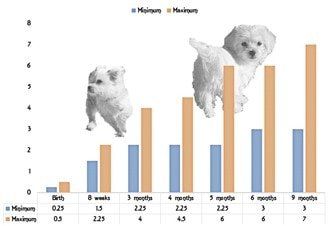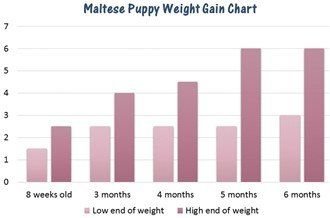Standing at just 7-9 inches tall, the Maltese might surprise you with its weight. Despite its small stature, this breed tends to weigh more than you might expect. So, what is the average weight of a Maltese?
Originating from the Mediterranean island of Malta, the Maltese breed has a rich history dating back thousands of years. These adorable dogs were bred to be companions, often favored by royalty. When it comes to their weight, the average Maltese typically weighs between 4-7 pounds. Although small, their weight can vary depending on factors such as genetics, age, and overall health. To maintain a healthy weight for your Maltese, it’s important to provide a balanced diet and ensure they receive enough exercise.
-330x218-960w.jpg)
What is the Average Weight of a Maltese?
When it comes to our beloved canine companions, every breed has its unique characteristics and traits. One question that frequently arises for dog owners, especially those considering the adorable Maltese breed, is: What is the average weight of a Maltese? It’s essential to have a good understanding of this aspect, as weight plays a crucial role in a dog’s health and well-being. In this article, we will delve into the average weight range for Maltese dogs, factors that can influence their weight, and tips for maintaining a healthy weight for your furry friend.
The Ideal Weight Range for Maltese Dogs
Maltese dogs are small in size but big in personality. On average, they typically weigh between 4 to 7 pounds (1.8 to 3.2 kilograms). However, it’s important to note that each dog is unique, and there may be slight variations within this weight range. Some Maltese dogs may weigh slightly less or more depending on factors like genetics, diet, exercise levels, and overall health. It’s always best to consult with a veterinarian to determine the ideal weight range for your specific Maltese.
Factors Affecting a Maltese’s Weight
The weight of a Maltese can be influenced by various factors. Genetics play a significant role, as smaller parents are more likely to produce smaller offspring. Diet is another crucial factor. Feeding your Maltese a balanced and nutritious diet in appropriate portion sizes will help them maintain a healthy weight. Overfeeding or providing excessive treats can quickly lead to weight gain in these small dogs. Additionally, exercise levels and overall activity play a role. Regular physical activity ensures that your Maltese stays fit and burns calories, helping to maintain a healthy weight.
Health conditions can also impact a Maltese’s weight. Some medical issues, such as thyroid problems or hormonal imbalances, can cause weight fluctuations. It’s important to monitor your Maltese’s weight and consult with a veterinarian if you notice any sudden or significant changes. They can help identify any underlying health conditions and provide appropriate guidance.
Lastly, it’s worth mentioning that age can also affect a Maltese’s weight. Puppies typically go through growth spurts and may gain weight rapidly during these stages. As they mature into adulthood, their weight may stabilize. Monitoring their weight and adjusting their diet accordingly as they age is important to ensure they stay within a healthy weight range.
Tips for Maintaining a Healthy Weight for Your Maltese
To keep your Maltese at a healthy weight, consider the following tips:
- Feed a balanced and nutritious diet designed for small breed dogs.
- Follow portion guidelines provided by your veterinarian and adjust accordingly based on your Maltese’s activity levels.
- Avoid excessive treats and opt for healthier alternatives like small pieces of fruits or vegetables.
- Ensure your Maltese gets regular exercise, such as short walks or play sessions.
- Monitor their weight regularly and consult with a veterinarian if you notice any significant changes.
- Consider puzzle toys or interactive feeders to provide mental stimulation while slowing down eating, preventing overeating.
Additional Information About Maltese Weight
Now that we’ve covered the average weight range, factors affecting weight, and tips for maintaining a healthy weight for Maltese dogs, let’s explore some additional information related to their weight:
Maltese Weight in Comparison to Other Dog Breeds
While the Maltese breed is known for its small size, weighing between 4 to 7 pounds, there are other dog breeds similar in weight or even smaller. Some examples include the Chihuahua, Yorkshire Terrier, and Toy Poodle. However, it’s important to note that although the Maltese might be small, they have a fluffy double coat that can make them appear larger than their actual weight.
Obesity in Maltese Dogs
Just as with any other breed, obesity can pose health risks to Maltese dogs. Extra weight can strain their joints, increase the risk of heart disease, and lead to a host of other health problems. It’s crucial to maintain a healthy weight for your Maltese to ensure a long and happy life. Regular exercise, a balanced diet, and portion control are key to preventing obesity.
The Importance of Regular Veterinary Check-Ups
Regular veterinary check-ups are essential for monitoring your Maltese’s weight and overall health. During these visits, your vet can assess your dog’s weight, provide guidance on diet and exercise, and check for any underlying health conditions that may affect their weight. They can also provide necessary vaccinations and preventive care to keep your Maltese in optimal health.
Conclusion
Understanding the average weight of a Maltese is crucial for ensuring your furry friend’s well-being. Although they are small dogs, their weight plays a significant role in their overall health. By following a balanced diet, providing regular exercise, and monitoring your Maltese’s weight, you can help them maintain a healthy weight range. Regular veterinary check-ups are also important for keeping an eye on their weight and addressing any health concerns promptly. With proper care, your Maltese will thrive and bring you joy for years to come.
Key Takeaways: What is the Average Weight of a Maltese?
– The average weight of a Maltese dog ranges from 4 to 7 pounds.
– Female Maltese tend to be slightly lighter than males.
– Factors such as genetics, diet, and exercise can influence a Maltese’s weight.
– It’s important to monitor a Maltese’s weight to ensure they stay healthy.
– Consulting with a veterinarian can help determine the ideal weight for a Maltese.
Frequently Asked Questions
Welcome to our FAQ section where we answer common questions about the average weight of a Maltese dog. If you’re curious about how much these adorable little dogs weigh, you’ve come to the right place. Read on to satisfy your curiosity!
Q: How much does a typical adult Maltese weigh?
A: On average, adult Maltese dogs typically weigh between 4 to 7 pounds. However, the weight can vary depending on factors such as genetics, diet, exercise, and overall health. It’s important to note that some Maltese may be slightly smaller or larger than the average weight range.
In general, a healthy adult Maltese should have a well-proportioned body with a weight that is appropriate for their size. If you have concerns about your Maltese’s weight, it’s always best to consult with a veterinarian for personalized advice.
Q: At what age is a Maltese considered fully grown?
A: A Maltese is typically considered fully grown by the time they reach one year of age. However, keep in mind that individual dogs may have slightly different growth rates. Most Maltese puppies will reach their adult height and weight by around 9-12 months.
During the first year of their life, Maltese puppies go through various growth stages. They start as tiny bundles of fur and gradually develop into the small, elegant dogs we know. Providing them with a healthy diet, regular exercise, and proper veterinary care will support their growth and development.
Q: Can a Maltese be overweight?
A: Yes, just like any other dog, a Maltese can become overweight if they consume more calories than they burn. It’s important to monitor your Maltese’s weight and ensure they are in a healthy range. Obesity can lead to various health issues, such as joint problems, heart disease, and diabetes.
To maintain a healthy weight for your Maltese, feed them a balanced diet appropriate for their size and age. Avoid excessive treats and snacks, and make sure they get regular exercise. If you’re unsure about your Maltese’s weight or nutrition, consult with a veterinarian for guidance.
Q: Can a Maltese be underweight?
A: Yes, a Maltese can be underweight if they are not getting enough food or have an underlying health issue. If you notice that your Maltese is excessively thin or not gaining weight as they should, it’s important to seek veterinary advice. Underweight dogs may have reduced energy levels, weakened immune systems, and other health complications.
A veterinarian will be able to assess your Maltese’s overall health, provide dietary recommendations, and rule out any underlying medical conditions. With proper care and nutrition, underweight Maltese dogs can regain a healthy weight and thrive.
Q: How can I help my Maltese maintain a healthy weight?
A: To help your Maltese maintain a healthy weight, it’s essential to provide them with a balanced diet tailored to their needs. Choose a high-quality dog food that is appropriate for their age, size, and activity level. Measure their food portions instead of free-feeding, and avoid excessive treats or table scraps.
In addition to proper nutrition, regular exercise is crucial for weight management. Take your Maltese for daily walks, engage in interactive play sessions, and provide mental stimulation to keep them active. Regular veterinary check-ups will help monitor their weight and overall health. Remember, a healthy weight contributes to a happy and vibrant Maltese!

Summary
Wondering about the weight of a Maltese dog? Maltese dogs typically weigh between 4 and 7 pounds. Although each dog is unique, this range gives you a good idea of what to expect.
The weight of a Maltese can be influenced by factors like genetics, diet, and exercise. Remember to consult with a veterinarian to ensure your Maltese is healthy and maintaining an appropriate weight.
